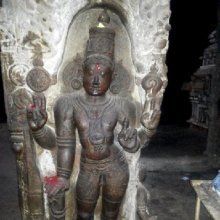Padya, Paḍyā, Pādya: 21 definitions
Introduction:
Padya means something in Hinduism, Sanskrit, Marathi, Hindi. If you want to know the exact meaning, history, etymology or English translation of this term then check out the descriptions on this page. Add your comment or reference to a book if you want to contribute to this summary article.
Padya has 20 English definitions available.
Alternative spellings of this word include Pady.
Images (photo gallery)
Languages of India and abroad
Sanskrit dictionary
[Deutsch Wörterbuch]
Source: Cologne Digital Sanskrit Dictionaries: Böhtlingk and Roth Grosses Petersburger WörterbuchPadya (पद्य):—
--- OR ---
Pādya (पाद्य):—1. (von pāda) adj. zum Fuss gehörig: aṅguli [Aitareyabrāhmaṇa 1, 19.] [The Śatapathabrāhmaṇa 3, 1, 4, 23. 6, 2, 1, 23.] [Kātyāyana’s Śrautasūtrāṇi 3, 1, 7.] udaka, auch einfach pādya n. Wasser zum Waschen der Füsse [Pāṇini’s acht Bücher 5, 4, 25.] [Scholiast] zu [6, 3, 53.] [Amarakoṣa 2, 7, 32.] [Hemacandra’s Abhidhānacintāmaṇi 500.] [Aitareyabrāhmaṇa 8, 24.] [ĀŚV. GṚHY. 1, 24.] [Śāṅkhāyana’s Śrautasūtrāṇi 4, 21, 3. 26.] [GṚHY. 3, 7.] [Kauśika’s Sūtra zum Atuarvaveda 90.] [Indralokāgamana 3, 2.] [Rāmāyaṇa 1, 2, 28. 9, 31. 25, 19. 52, 16. 2, 90, 6.] [Prabodhacandrodaja 22, 6.]
--- OR ---
Pādya (पाद्य):—2. (wie eben) am Ende eines comp. nach adhyardha und Zahlwörtern [Pāṇini’s acht Bücher 5, 1, 34.] — Vgl. aṣṭāpādya .
--- OR ---
Padya (पद्य):—
3) b) [Spr. 2777.] - [Sp. 464, Z. 4 lies
4) Stenzler 3]). —
4) [Oxforder Handschriften 198,b, No. 468. 207,a,5.] padyaṃ catuṣpadī tacca vṛttaṃ jātiriti dvidhā [kāvyādarśa 1, 11.] [Weber’s Indische Studien 8, 289.] [WEBER, Rāmatāpanīya Upaniṣad 362] (padyāḥ!) . [363.] —
5) n. Titel verschiedener Hymnen [HALL 146. 152.] — Vgl. mahā .
Source: Cologne Digital Sanskrit Dictionaries: Sanskrit-Wörterbuch in kürzerer FassungPadya (पद्य):——
1) Adj. (f. ā) — a) auf den Fuss bezüglich , zum Fusse gehörig. — b) *den Füssen Schmerz verursachend. — c) *Fusstritte zeigend , mit Fussspuren versehen. — d) einen Fuss lang und breit Comm. zu [Kātyāyana’s Śrautasūtra 17,5,3.] — e) aus Versgliedern gebildet. — f) final. —
2) m. — a) *ein Śudra. — b) Worttheil. —
3) f. padyā , padiā — a) Pl. Fusstritte , Hufschläge , — b) *Weg , Pfad , — c) ein Fuss als Längenmaass. —
4) n. — a) Vers — b) Titel verschiedener Hymnen.
--- OR ---
Pādya (पाद्य):——
1) Adj. (f. ā) — a) zum Fuss gehörig , zum Waschen der Füsse dienend. — b) ein Viertel von Etwas betragend [Śulbasūtra 3,45,64.] —
2) n. Wasser zum Waschen der Füsse.
Sanskrit, also spelled संस्कृतम् (saṃskṛtam), is an ancient language of India commonly seen as the grandmother of the Indo-European language family (even English!). Closely allied with Prakrit and Pali, Sanskrit is more exhaustive in both grammar and terms and has the most extensive collection of literature in the world, greatly surpassing its sister-languages Greek and Latin.
See also (Relevant definitions)
Starts with (+31): Padyaanivadunga, Padyabamdha, Padyabjamala, Padyacamana, Padyadana, Padyadravya, Padyagamdhi, Padyahna, Padyaka, Padyakadambari, Padyakara, Padyakavya, Padyala, Padyalaya, Padyamala, Padyamatrika, Padyamaya, Padyami, Padyamrita, Padyamritasamudratika.
Ends with (+36): Adhyardhapadya, Aikapadya, Ananyanishpadya, Anukramiki yogapadya, Anupadya, Anutpadya, Apadya, Ardhapadya, Arkapushpadya, Ashtapadya, Ayaugapadya, Balipadya, Catupadya, Cipadya, Dantapadya, Dashapadya, Dhadapadya, Dhrupadya, Dirghapadya, Duhsampadya.
Full-text (+92): Pajja, Trigrahin, Dvipadya, Padyaveni, Padyamaya, Padyapatra, Apadya, Ashtapadya, Padu, Padyaprasunanjali, Padyashataka, Pratipadyatva, Padyasamgraha, Padyapanjashika, Padyaracana, Padyamuktavali, Sampadyatva, Padyamala, Nishpadyatva, Padyakadambari.
Relevant text
Search found 60 books and stories containing Padya, Paḍyā, Pādya, Padyā, Pāḍya, Paadya; (plurals include: Padyas, Paḍyās, Pādyas, Padyās, Pāḍyas, Paadyas). You can also click to the full overview containing English textual excerpts. Below are direct links for the most relevant articles:
Garga Samhita (English) (by Danavir Goswami)
Verse 6.13.9 < [Chapter 13 - The Glories of Prabhāsa-tīrtha, the Sarasvatī River, etc.]
Verse 5.9.50 < [Chapter 9 - The Happiness of the Yadus]
Verse 5.20.8 < [Chapter 20 - The Liberation of Ṛbhu Muni During the Rāsa-dance Festival]
Rig Veda (translation and commentary) (by H. H. Wilson)
Whither Telugu < [April – June, 1999]
Free-Verse Front in Modern Poetry < [October – December, 2005]
A Literary Conference of Cultural Value < [January – March, 1998]
Malatimadhava (study) (by Jintu Moni Dutta)
Part 6.1 - Definition of Chandas (metres) < [Chapter 2 - Literary Study of the Mālatīmādhava]
Atithi or Guest Reception (study) (by Sarika. P.)
Part 6 - References to Hospitality in Bhāsa’s plays < [Chapter 4 - Atithi-saparyā in Classical Sanskrit Literature]
Part 1 - Treatment of Atithi (guest-reception) in Rāmāyaṇa < [Chapter 3 - Atithi-saparyā in Epics and Purāṇas]
Part 5 - How to appease an Atithi? < [Chapter 9 - Atithi-saparyā in Dharmaśāstra Literature]
Mudrarakshasa (literary study) (by Antara Chakravarty)
1. Chandas, the science of rhythm < [Chapter 4 - Employment of Chandas in Mudrārākṣasa]
